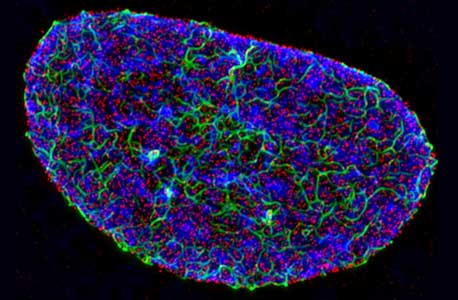*********
The current COVID-19 situation is challenging and difficult for all of us - we hope this virtual conference will allow colleagues to share and discuss their latest research, while under travel and stay-at-home restrictions.
*********
The eleventh Cold Spring Harbor meeting on Genome Organization and Nuclear Function is going fully virtual and will now likely commence mid-morning (10am) US eastern standard time on Tuesday, April 28, 2020 and end on Friday May 1 late afternoon (EST). The specific goal for this meeting is to bring together cellular and molecular biologists to discuss recent advances in the spatial and temporal aspects of nuclear structure/function.
Wendy Bickmore, MRC Human Genetics Unit, University of Edinburgh, UK
Alistair Boettiger, Stanford University
Martha Bulyk, Brigham & Women's Hospital & Harvard Medical School
Job Dekker, University of Massachusetts Medical School
Peter Fraser, Florida State University
Eileen Furlong, European Molecular Biology Laboratory, Germany
Geeta Narlikar, University of California, San Francisco
Jennifer Phillips-Cremins, University of Pennsylvania
David Spector, Cold Spring Harbor Laboratory
Sara Wickstrom, Helsinki Institute of Life Science, Finland
X. Sunney Xie, Peking University, China

Image Credit: Cancer cell nucleus. A. Buchwalter, Hetzer Lab, The Salk Institute (2012)
The format of the meeting will include oral sessions consisting of two 15-minute anchoring talks by the discussion leaders and seven 12-minute talks, selected from the abstracts, principally on unpublished work. In addition, there will be two poster sessions, one in the afternoon and one in the evening. The organizers will decide the suitability of each abstract for oral or poster presentation, but please specify if you prefer a poster.
Abstracts should contain only new and unpublished material and must be submitted electronically by the abstract deadline. Selection of material for oral and poster presentation will be made by the organizers and individual session chairs. Status (talk/poster) of abstracts will be posted on our web site as soon as decisions have been made by the organizers. Status (talk/poster) of abstracts will be posted on our web site as soon as decisions have been made by the organizers. Program decisions have not yet been made by the organizers and session chairs.
We are eager to have as many young people as possible attend since they are likely to benefit most from this meeting. We have applied for funds from government and industry to partially support graduate students and postdocs. Apply in writing to Val Pakaluk stating need for financial support - preference is given to those submitting abstracts.
All questions pertaining to registration, fees, housing, meals, transportation, visas, abstract submission or any other matters should be directed to Val Pakaluk
This conference will be supported in part by funds provided by:
Pricing:
Virtual Attendance Package: $300
Virtual Graduate Student Package: $175
Virtual Attendance packages include registration, access to online Zoom-based oral sessions, access to the digital posters, a dedicated Slack channel and access to the video archive on the Leading Strand for ~six weeks following the meeting.